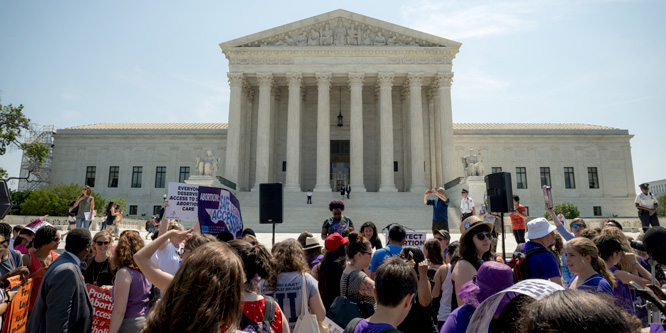
Photo: Getty Images/Joel Carillet
May 5, 2022
How should retail companies best navigate the abortion controversy?
A leaked initial draft of an opinion by Supreme Court Justice Samuel Alito that indicates the court will overturn Roe versus Wade and put the power to regulate abortions, including making them illegal, in the hands of states instead of the federal government has become a business issue overnight.
Amazon.com, Apple and Levi Strauss & Co. and others have come forward with medical travel programs to assist women who may find their access to an abortion limited or nonexistent, depending on where they live in the country.
A blog post on the Levi Strauss site expressed the company’s position on the issue: “Access to reproductive health care, including abortion, has been a critical factor to the workplace gains and contributions women have made over the past 50 years. Further restricting or criminalizing access will jeopardize that progress and disproportionately affect women of color, putting their well-being at risk and impeding diverse hiring pipelines. Women in some states would have fewer rights than women in others, and our country would be consigned to a more unjust and inequitable future. What’s more, companies would need different health policies for different locations — including coverage for time off and travel across state lines — to ensure employees can access reproductive health care.”
Levi’s said current employees enrolled in its health program have access to travel expenses to cover fees should they need to leave their home state to seek an abortion. The company added that an internal process is underway to extend the same benefits to part-time workers.
Other companies including Amazon.com, Apple, Citigroup and Yelp have made similar offers to employees working in states that have recently passed laws making it more difficult to get a legal abortion.
The Guttmacher Institute, which studies reproductive health and rights, forecasts that 26 states would directly outlaw or severely restrict access to abortions should the Supreme Court decide to strike down the previous legal precedent.
Amazon on Monday informed its staff that it would pay up to $4,000 in travel expenses annually for them to receive non-life threatening medical care not available within 100 miles of where they live. The company made the new benefit retroactively effective to Jan. 1, reports Reuters.
Apple has notified retail employees in Oklahoma and Texas, two states that have passed restrictive abortion laws this year, that it will cover travel expenses should they need to travel for abortions.
- Read Justice Alito’s initial draft abortion opinion which would overturn Roe v. Wade – Politico
- Protecting Reproductive Rights – A Business Imperative – Levi Strauss & Co.
- Abortion and female labor force participation: Evidence prior to Roe v. Wade – Journal of Labor Research/Springer Nature
- Minority women most affected if abortion is banned, limited – ABC News
- Socioeconomic Outcomes of Women Who Receive and Women Who Are Denied Wanted Abortions in the United States – National Library of Medicine/PubMed Central
- Amazon to reimburse U.S. employees who travel for abortions, other treatments – Reuters
- How U.S. companies are supporting workers on abortion – Tribune News Service/The Philadelpia Inquirer
Discussion Questions
DISCUSSION QUESTIONS: Would the ending of legal abortions in some states and not others put companies in a position of having to establish different health policies based on the location of workers? How should retailer and consumer brand businesses best navigate the controversy surrounding the possible overturning of Roe V. Wade?
Poll
BrainTrust
DeAnn Campbell
Head of Retail Insights, AAG Consulting Group
Recent Discussions







Men shouldn’t be weighing in on this sorry. I support any company that listens to the women in their workforce on the issue.
We are of course stating the obvious when we say that, for companies, nothing is easy about this issue. In a NY Times piece today entitled “Corporate America Doesn’t Want to Talk Abortion, but It May Have To,” the paper wrote: “For some major companies that have been known to weigh in on political and social issues, this week has been unusually quiet. Walmart, Disney, Meta, PwC, Salesforce, JPMorgan Chase, ThirdLove, Patagonia, Kroger and Business Roundtable were among the companies and organizations that declined to comment or take a position, or did not respond to requests for comment about whether they plan to make public statements about their stance on abortion.”
This is such a sad and tragic situation, I barely know where to begin. While I would love to see retailers just keep out of it, they can’t. If they have a disparate network of stores and/or DCs, they should assist or at least condone women following their hearts on these matters.
This decision puts all of us in a terrible position, and retailers are no exception. I honestly have very few words beyond “I wish retailers could stay out of political matters, but sometimes you have to be both competitive and compassionate.”
Wow! I am impressed with these companies. I am impressed not only with their freedom of choice-centric decision but also with the speed it has been implemented.
My first thought in reading the question was that companies should not take a position. Now they have changed my mind 180 degrees. It is simple, provide their employees with the healthcare they need no matter where they work. And no matter how others try to restrict their freedom.
Well said.
When i first saw this topic this morning, I said why is this a discussion in the retail sector, but then I read Rick’s response and understood why it is. Management should listen to any concerns and provide any compassion internally. I wish that companies would tend to their everyday business but I also know they probably won’t be able to stay silent for long, which is unfortunate.
It is up to retailers to decide what position they wish to take. However many will be forced to take some kind of stance as they need to determine staff health policies. One complication is states putting in place onerous laws that allow those “aiding” aborting to be prosecuted. If Amazon funds someone living in such a state to have an abortion elsewhere is it liable for prosecution?
My personal view is very simple. Women have a right to control their own bodies and health decisions. Neither the state, nor other people, have a right to interfere in such decisions. Keep your nose out and mind your own business!
Retailers’ top priority should be the health and well being of their employees. They should support their team members’ privacy and provide them with the resources they need to make their own choices about health care. Including, helping them escape states that are imposing restrictions on women, children, and parents. I also believe they need to advocate for their vulnerable team members in the jurisdictions where they do business. Company values matter. We’ve said so about environmental issues, labor practices, discrimination based on race — but to stop this support at gender issues is not only disingenuous, it sends a terrible message to half of their workforce and customers.
Any company, retail or not, should be following Levi’s in its example of supporting their employees and their communities. Our voices are everything.
How retailers and brands support or do not show support will translate to customer and employee loyalty. Aligning with values on equality, diversity and inclusion, racism and abortion rights are the very values that will fuel the “great resignation.” Like customers, employees have more choices than ever and it’s important to remain authentic in what we believe in. Make a stand.
Companies are going to have to follow their employees to retain talent, the single most important factor to success – so their siting decisions have consequences. Move to Texas for the low taxes and regulations, but prepare to lose your best and brightest to Minnesota, California, and Hawaii…
Unlike government, retail must stay aligned with the preferences of shoppers and staff to survive in business. Companies like Hobby Lobby, with religion guided policies, have had a hard time in pro-choice states. Abortion has been one of our country’s most divisive topics for decades, and likely to remain so for decades more so a long term strategy is needed. Companies like Chik-fil-A have found success by keeping focus on product quality and exceptional service, and finding middle ground in their health policies to retain good staff.
I have found that discussing politics in business is never a good idea, but how can businesses navigate this issue without speaking out? They are forced to jump in because it has such a direct effect on staff. Staff that most companies are desperately trying to hold on to. This issue has such profound consequences that we have not even scratched the surface of the consequences that will result.
Businesses that are taking a stand to help their employees should be rewarded and appreciated.
Retailers who are offering medical benefits to their employees, such as travel allowances to get the care they need — whether it’s an abortion, cancer treatment whatever — wherever they need it, are my heroes. But those that take a political position publicly, such as Disney did with the “don’t say gay” law, should be prepared for the backlash unfortunately. These are tumultuous times.
I admire the companies that have already taken a stand in support of its employees who may wish to use the 50-year-old protection of abortion rights. But the Disney situation in Florida — in which the company was punished by the state for taking a stance in support of its associates — is probably giving other companies some pause. I’m not sure there will be a rush to take one position or another until the Supreme Court issues its final ruling.
Companies must carefully plan their corporate response or strategic silence to Roe V. Wade — and expect a backlash no matter what they choose.
Listening to consumers, employees and no doubt investors will weigh on retail companies’ decision about whether to take a stand and how.
Roe is the tip of a very toxic icebergs and retailers shouldn’t think about the this as “only” a choice issue. For example, gay marriage is not a specifically guaranteed right under the original Constitution. So if Roe is overturned — and if its defeat is seen as establishing a larger, broader precedent — what do retailers who extend healthcare benefits to same sex partners/spouses if SCOTUS strikes down same-sex marriage laws? Ditto with interracial marriages. And, for that matter, slavery was legal in parts of the country when the Constitution is ratified, so what are the implications of that on Black Americans today? Sound far fetched? Up until recently so did the idea of turning over a 50 yearly “Black Letter” law. Overturning Roe may split our society and retailers will have to navigate their way through all the social, political, and cultural milestones that it would surface. But things could – and very well may — get even worse and retailers and CPG companies need to game out their responses now.
You don’t navigate these issues. You lead by example. The days when corporations and leaders could stay out of politics and social issues are long gone. I am proud to have spent several years working at Levi’s in San Francisco. My admiration for the company has never been higher.
I will not comment on the topic or even hint at my opinions as a CEO. As a private citizen, I may share some thoughts, or not, depending on the company I am with. My personal comments in any environment can affect the perception of my businesses and I must always be mindful of that fact. I believe that companies should stay neutral on topics such as these, as much as humanly possible. And, yes there are always going to be times when this may need to be put aside, but leaders need to always have their fiduciary hats on first before weighing in on such topics.
I would think this (first) question would be better answered on LegalWire, but with regard to the latter question (how to navigate the controversy) I think the answer is clear and simple: stay out of it … this isn’t a retail issue.
While many wish it was possible to separate politics from business, it’s no longer possible when lives and personal choices that for years have been legal are being up-ended by a minority of the people.
Retailers will have to take a stand — highly public or not — through its policies, benefits and healthcare plans. And they will need to be prepared for fall-out regardless of what position they take. There are no winners in this situation.
Don’t.
Is there anyone who can give an expert opinion on this? No, not even if you’re a woman who has made that “choice” or one who believes it was not within her “rights” even to make it. Indeed no man could have a say on this particular subject too. However, some of us are experts on how and why companies spend their money one way or another and how or why they speak on certain things; and each of us is an absolute authority on how and why we spend our own money and say or do certain things.
And in both instances, what is said does not always match what is done.
Levi’s, a brand I had always admired and worn for years (going back to when their jeans were chosen for me and not by my choice), has shown great courage in coming out with such support of their workers’ healthcare needs. But until they experience any remarkable downturn in business away from those on the “other side” of this issue; or they decide not to do business in places where certain practices become wholly restrictive—and not just for their workers but the entire affected populace—and still stay their course, can we say theirs was about action and not just words?
For Levi’s (or Apple, or “put name here”) to make the point stick would be prohibiting sales to any individual who does not follow what rights and choices they follow. But cumulatively, that would cost companies way more money (and awareness of the imperfection of humankind) than they have already determined they can afford to lose possibly. (This is a game being played out in Florida. Where the governor is gambling on how much his state can pay versus how much Disney may lose by having their say. Meanwhile, the “mouse” could really “roar” if they left the state. But the cost of that may exceed the price they’re willing to pay—even for their workers’ rights)
The same ruse can be said of us, too. As experts of our spending habits, in that moment of truth, we know how often our higher selves get turned off when acquiring that lower-priced item.
This is about choice and having and keeping our absolute rights to them. But it is also about following through on every painful and awkward part when one is chosen and dealing with the good or bad consequences of doing so. Can any of us, person or place, say that is so, absolutely?